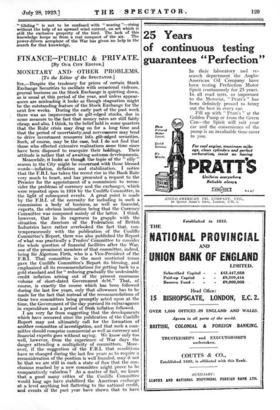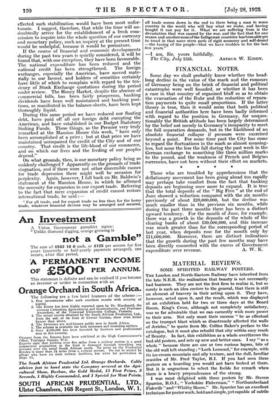FINANCE-PUBLIC & PRIVATE.
[By OUR CITY EDITOR.]
MONETARY AND - OTHER PROBLEMS.
[To the Editor of the SPECTATOR.] SIR,—Despite the tendency for prices of certain Stock Exchange Securities to oscillate with occasional violence, general business on the Stock Exchange is quieting down, as is usual at this period of the year, and unless appear- ances are misleading it looks as though stagnation might be the outstanding feature of the Stock Exchange for the next few weeks. During the early part of the past week there was an improvement in gilt-edged stocks, due in some measure to the fact that money rates are still fairly cheap, and also, I think, to the belief held in some quarters that the Ruhr crisis may drag on for a long time and that the period of uncertainty,arql nervousness may tend to drive investment resources info gilt-edged securities. Such, of course, may be the case, but I. do not find that - those who effected extensive realizations some time since have been disposed to reacquire their holdings. Their attitude is rather that of awaiting autumn developments. Meanwhile; it looks as though the- topic of the developments. silly " . season in the City might be cones with those blessed words—inflation, deflation and stabilization. I notice that the F.B.I. has taken the recent rise in the Bank Rate very much to heart, and has presented a request to the Premier for the appointment of a commission to recon- sider the problems of currency and the exchanges, which were reported upon in 1918 by the Cunliffe Committee, in the light of subsequent events. A great point is made by the F.B.I. of the necessity for including in such a commission a body of business, as well as financial, experts, the obvious insinuation being that the Currency Committee was composed mainly of the latter. I think, however, that in its eagerness to grapple with the situation the directors of the Federation of British Industries have rather overlooked the fact that, con- temporaneously with the publication of the Cunliffe Committee's Report, there was also published the Report of what was practically a Traders' Committee to consider the whole question of financial facilities after the War, one of the prominent members of that committee, indeed, being Sir Algernon Firth, who is a Vice-President of the F.B.I. That committee in the most unstinted terms gave the Cunliffe Committee's Report its- blessing, and emphasized all its recommendations for getting back to a gold standard and for " reducing gradually the undesirable credit inflation arising out of the present enormous volume of short-dated Government debt." That, of course, is exactly the course which has been followed during the last few years, only that allowance has to be made for the fact that instead of the recommendations of these two committees being promptly acted upon at the time, the Government of the day pursued its extravagance in expenditure and a period of fresh inflation followed. I am very far from suggesting that the developments which have occurred since the publication of the Cunliffe Report may not ultimately call for the formation of another committee of investigation, and that such a com- mittee should comprise commercial as well as currency and financial experts goes without saying. We know only too well, however, from the experience of War days the danger attending a multiplicity of committees. More- over, if the suggestion of the F.B.I. that conditions have so changed during the last few years as to require a reconsideration of the position is well founded, may it not be that we are still in such 'a state of flux that the con- clusions reached by a new committee might prove to be comparatively valueless ? As a matter of fact, we know that a good many critics of the Cunliffe Committee would long ago have stabilized the American exchange at a level anything but flattering to the national credit, and events of the past year have shown that to have effected such stabilization would have been most unfor- tunate. I suggest, therefore, that while the time will un- doubtedly arrive for the establishment of a fresh com- mission to inquire into the whole question of our currency and monetary policy, such an inquiry at the present.time would be unhelpful, because it would be premature. If the course of financial and economic developments -during the past two years is quietly considered, it will be found that, with one exception, they have been favourable. The national expenditure has been reduced and the national credit has been strengthened. The foreign exchanges, especially the American, have moved mate- rially in our favour, and holders of securities certainly have little of which to complain with regard to the ten- dency of Stock Exchange quotations during the period under review. The Money Market, despite the absence of commercial bills, has been fairly prosperous, banking dividends have been well maintained and banking posi- tions, as manifested in the balance-sheets, have been kept thoroughly liquid. During this same period we have reduced our floating debt, have paid off all our foreign debt excepting the American, and have established in our Budget Statutory Sinking Funds. These things, as the Premier very truly remarked at the Mansion House this week, " have only been accomplished at a price ; but at that price we have maintained unimpaired the credit of the City and of our country. That credit is the life-blood of our commerce, and on which our lives and the feeding of our peoples depend." On what grounds, then, is our monetary policy being so suddenly challenged ? Apparently on the grounds of trade stagnation, and if there were not other discernible causes for trade depression there might well be occasion for perplexity. Again, however, I fall back on Mr. Baldwin's statement at the Mansion House, in which he affirmed the necessity for expansion in our export trade. Referring to the fact that mere expansion of credit cannot restore international trade, he said :- " For all trade, and for export trade no less than for the home trade, whatever financial devices may be arranged and secured,
all trade comes down in the end to there being a man in some country in the world who will buy what we make, and having bought it can pay for it. What we are suffering from is the devastation that was caused by the war, and the fact that for one reason and anothernoneof the belligerent countries has beenablert to tread in that same stern path of rigid economy and self-denial —the taxing of the people—that we have trodden in for the last five years."
—I am, Sir, yours faithfully,







































 Previous page
Previous page